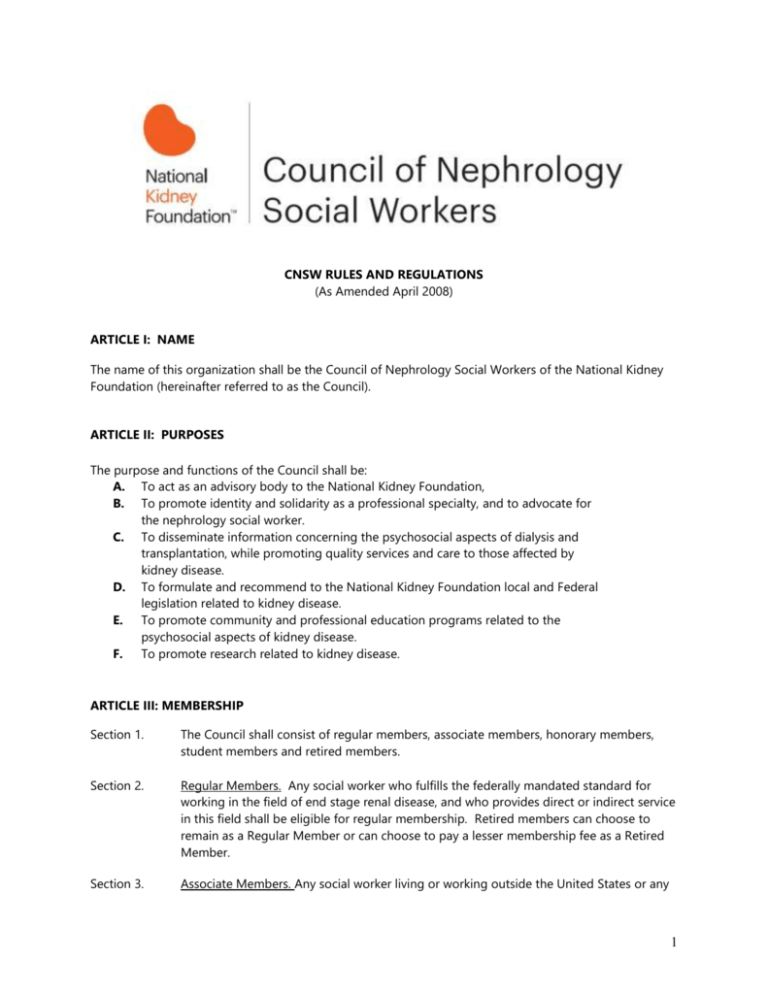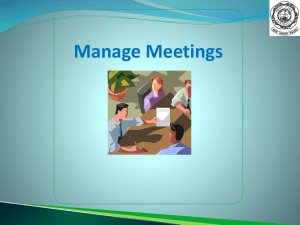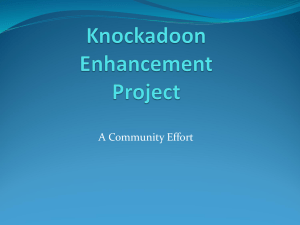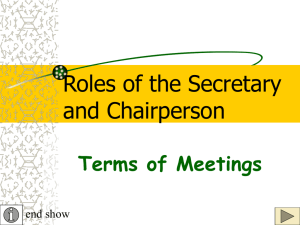CNSW RULES AND REGULATIONS - National Kidney Foundation
advertisement

CNSW RULES AND REGULATIONS (As Amended April 2008) ARTICLE I: NAME The name of this organization shall be the Council of Nephrology Social Workers of the National Kidney Foundation (hereinafter referred to as the Council). ARTICLE II: PURPOSES The purpose and functions of the Council shall be: A. To act as an advisory body to the National Kidney Foundation, B. To promote identity and solidarity as a professional specialty, and to advocate for the nephrology social worker. C. To disseminate information concerning the psychosocial aspects of dialysis and transplantation, while promoting quality services and care to those affected by kidney disease. D. To formulate and recommend to the National Kidney Foundation local and Federal legislation related to kidney disease. E. To promote community and professional education programs related to the psychosocial aspects of kidney disease. F. To promote research related to kidney disease. ARTICLE III: MEMBERSHIP Section 1. The Council shall consist of regular members, associate members, honorary members, student members and retired members. Section 2. Regular Members. Any social worker who fulfills the federally mandated standard for working in the field of end stage renal disease, and who provides direct or indirect service in this field shall be eligible for regular membership. Retired members can choose to remain as a Regular Member or can choose to pay a lesser membership fee as a Retired Member. Section 3. Associate Members. Any social worker living or working outside the United States or any 1 allied health professional interested in the field of end stage renal disease shall be eligible for associate membership. In addition, those persons supporting the purposes of the Council and those rendering special services to the Council shall be eligible for associate membership. Associate members may vote, but shall not hold office or act as Chairperson of a Committee. Section 4. Student Any student is eligible for membership but is not eligible to vote or hold office. Section 5. Honorary Members. Anyone may be awarded honorary membership upon recognition of special services to the Council for unusual work in the field of interest of the Council. They shall not have the privilege of voting, holding office or serving as a Chairperson of a Committee unless they also qualify for Regular Membership. They shall not be required to pay annual dues. Section 6. Retired Members – Any social worker who previously fulfilled the federally mandated standard for working in the field of end stage renal disease providing direct or indirect service, and is now retired, is eligible for membership. The retired social worker is not eligible to vote or hold office. The dues for the Retired Member shall be the same as for a Student member. ARTICLE IV: CHAPTERS Section 1. Chapters of the Council may be formed according to criteria determined by the Executive Committee of the Council. ARTICLE V: EXECUTIVE COMMITTEE Section 1. Purpose. Between the annual meetings, the purposes of the Council shall be carried out by an Executive Committee. Section 2. Composition. The Executive Committee shall consist of the Chairperson, ChairpersonElect, Immediate Past Chairperson, Membership Chairperson, Publications Chairperson and Co-Chairperson, Clinical Nephrology Program Chairperson and Co-Chairperson, Professional Education Chairperson and Regional Representatives of the five National Kidney Foundation Regions. Section 3. Officers. The officers of the Council shall be a Chairperson, Chairperson-Elect, and Immediate Past Chairperson. The Chairperson and Chairperson-Elect shall be elected in odd numbered years for a two-year term. The Chairperson must have at least two (2) years of experience on the Executive Committee. Previous CNSW Executive Committee experience is preferred for the Chairperson-Elect position. Alternatively, prior experience or knowledge working with CNSW or National Kidney Foundation boards and programs, along with a letter of support from the candidate’s CNSW Regional Representative, will suffice. At the end of the Chairperson’s two-year term of office, the Chairperson-Elect will automatically assume the Chairperson position for a two-year term. The previous 2 Chairperson will become Immediate Past Chairperson. The Immediate Past Chairperson's term on the Committee shall be for two (2) years following his/her term as Chairperson of the Council. Section 4. Chairpersons/Regional Representatives. Membership Chairperson and Regional Representatives of I, III and IV will be elected in even numbered years for a two- year term. Regional Representatives of II and V will be elected in odd numbered years for a two-year term. The Clinical Nephrology Program, Publications and Professional Education Chairpersons and Co-Chairpersons will be appointed by the Chair with the approval of the Executive Committee. The term of office of such appointee shall continue for two years, with a possible reappointment to additional terms at the discretion of the Chairperson. Region Representatives must live in the NKF/CNSW region from which they are elected. Section 5. Election of Executive Committee. The Executive Committee shall be nominated by the Nominating Committee of the Council. The Nominating Committee shall seek suggestions from all categories of membership. The Immediate Past Chairperson of the Council shall serve as the Chairperson of the Nominating Committee. If possible, at least two nominees shall be presented for each office. The ballots bearing the names of the nominees and offices for which they have been nominated shall be available for electronic voting. Members will be notified by postcard and/or the CNSW listserv, as well as through Renalink, on instructions for online voting. CNSW members in good standing may vote only for the Region Representative for the region in which they reside. Elections shall be by majority vote of those members who vote in the election. In the event of a tie vote for any Executive Committee position, no less than five members of the CNSW Executive Committee will vote by secret ballot. To maintain an odd number of votes, as needed, the Nominations Chair will either vote or abstain from voting. The Nominations Chair will tally the votes and announce the winner. Any Executive Committee member who is a candidate in the tie vote will abstain from voting to break the tie. Announcement of results shall be at the clinical meeting, in CNSW publications and on the CNSW general membership listserv. Section 6. Term of Office. Each member of the Executive Committee shall serve for a two-year term. The term shall commence upon such officer's installation at such annual business meeting. Each officer shall be eligible for reelection for not more than one additional term of office in the same position consecutively. If the officer is first appointed to fill a vacant position, she/he is eligible for re-election twice to that same position consecutively. The Chairperson and Chair-Elect cannot run for re-election to the same position for consecutive terms. Section 7. Vacancy in Office. In the event of a vacancy in any elected office, except Chairperson, the Executive Committee shall elect a successor from nominees selected for such office by the 3 Nominating Committee. The appointee to fill such a vacancy shall serve until the next election. In the event the Past Chairperson cannot fulfill their duties, the Executive Committee will appoint an individual to complete the term and fulfill the duties of the office of Past Chairperson, If the office of the Chairperson should become vacant before completion of a two-year term, the Chairperson's duties shall be passed on to the Chairperson-Elect for the remainder of that term. Section 8. Eligibility for Office. Regular members shall be able to seek and hold elected office only as long as he/she meets the requirements for regular membership. If the regular membership requirement cannot be met, the officer may remain in the office for no more than a four-month transition period. Regular members who have previously provided direct services (that meet the federally mandated standard) for at least two of the past ten years are eligible to seek and hold office if presently providing indirect service or recently retired. Indirect services will be interpreted as MSWs who work in the ESRD arena providing patient education to ESRD patients, MSWs who are renal administrators, MSW supervisors of nephrology social workers who meet the federally mandated standard, MSWs who are ESRD Network social workers, MSWs pursuing advanced degrees, etc. All candidates must demonstrate, to the nominating committee, knowledge of the current issues in nephrology social work practice. Section 9. Removal From Office. An officer may be removed from office for nonperformance of duties as outlined in the Position Objectives or actions contrary to the interests of the Council. A 2/3 vote of the Executive Committee and official notification by the Chairperson of the Council is required. ARTICLE VI: AD HOC COMMITTEES The Chairperson of the Council may appoint Ad Hoc Committees as it may be deemed necessary. The Chairperson and members of such Committees shall serve from the date of their appointment until the next annual meeting of the Council at which time such Committee may again be appointed by the Chairperson. All Regular Members in good standing are eligible to serve on an Ad Hoc Committee. ARTICLE VII: DUES The Council is a nonprofit organization and any dues collected shall be utilized only for operational and educational purposes. Council membership (which includes membership in the National Kidney Foundation) is dependent upon paying the assessed annual dues of professional members. ARTICLE VIII: GENERAL Section 1. Ru1es and Regulations. The Rules and Regulations may be amended by vote conducted by mail prior to the annual meeting and the results announced at the annual meeting. Voting may also occur electronically. Changes in the Rules and Regulations may be proposed by recommendation of the Executive Committee or the Rules and Regulations 4 Committee. Members may propose changes to the Rules and Regulations through their Region Representative. Section 2. Policy. Policy is a definite course or method of action selected to guide and determine present and future major decisions within the framework of the Rules and Regulations. All policy must be proposed through the Executive Committee and ratified by the majority of the return vote of the membership. Operational guides can be decided upon by the Executive Committee without membership approval to handle the day-to-day workings of the Council. Section 3. Conduct of Business In the event that the operation of the Council has procedural questions, Robert’s Rules of Order shall govern to the extent compatible herewith. Section 4. Minutes and Communication. The minutes of the Executive and all Committees shall be open to inspection by the membership. Committees may freely communicate with the membership at large via any CNSW Newsletter. Section 5. Research Grants. The Chairperson-Elect shall have the responsibility of chairing the Research Grants Committees While in office; the Chairperson-Elect shall not be eligible for a research grant. Section 6. Quorum. Eight members of the Executive Committee present at any Executive Committee meeting or Executive Committee conference call shall constitute a quorum for all purposes, and the action of the majority of the members present shall be the actions of the CNSW. For future reference a Quorum is defined as one-half the number of members of the Executive Committee plus one more member. 5







